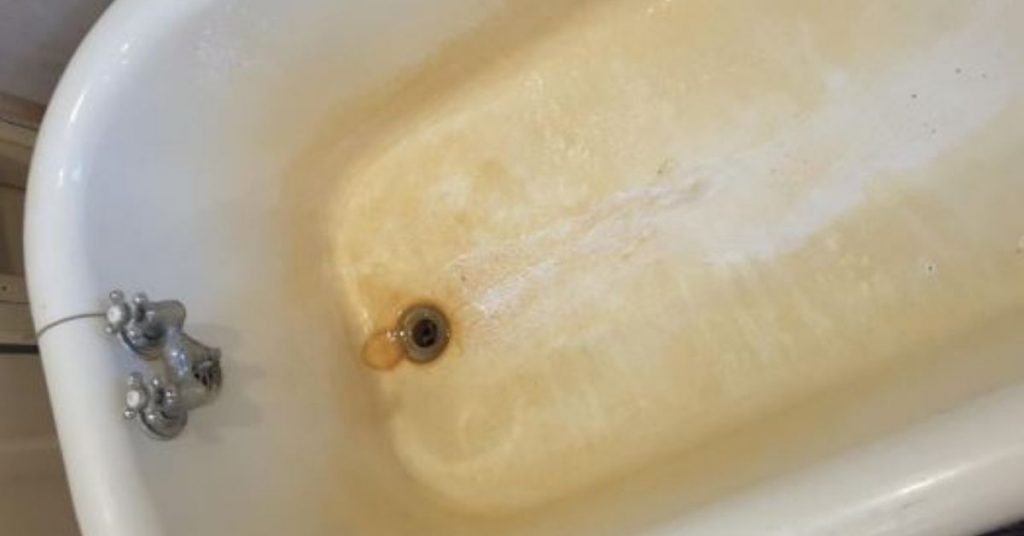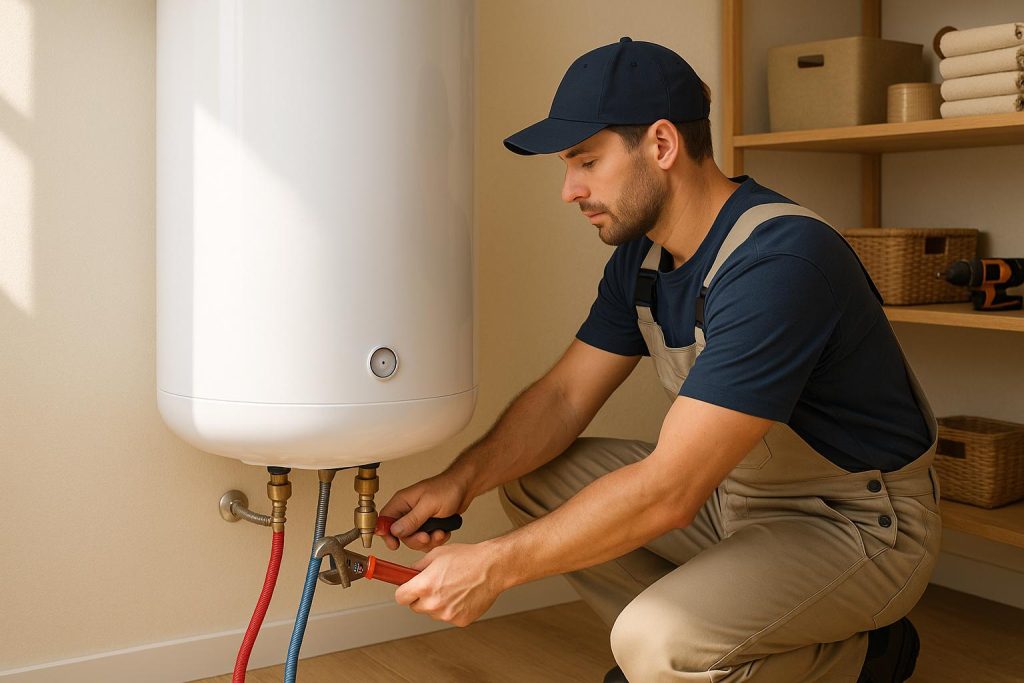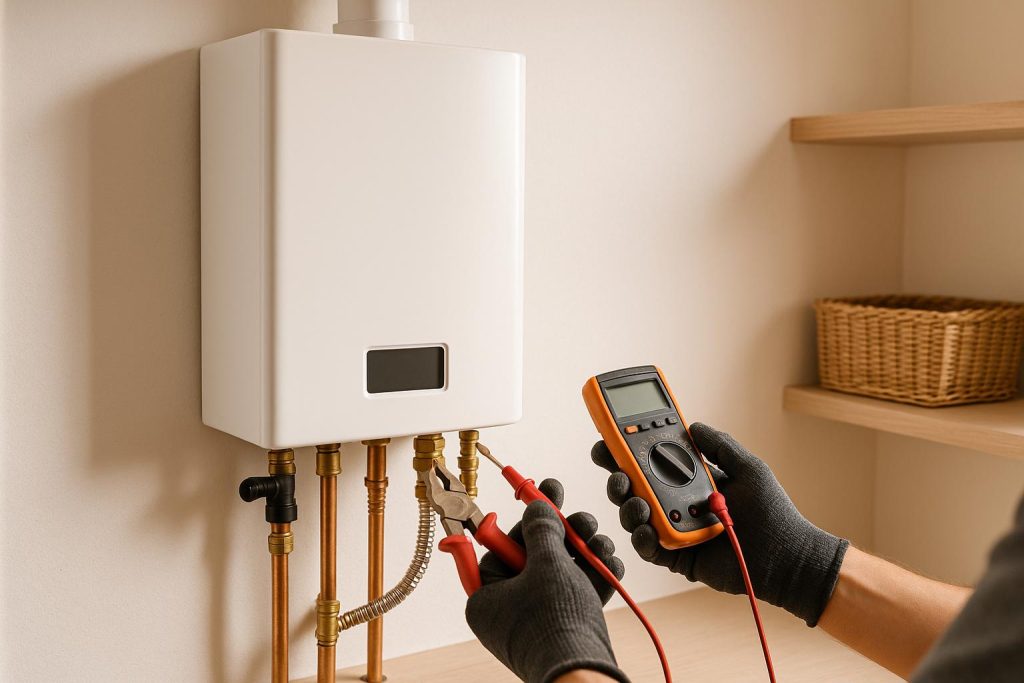
Removing rust stains from a bathtub can restore its cleanliness and appearance. Here’s a brief summary of how to get rid of rust stains:
- Gather Your Supplies: You’ll need white vinegar, baking soda, a soft cloth or sponge, and a scrub brush.
- Safety Precautions: Ensure proper ventilation, and wear gloves and eye protection when working with cleaning agents.
- Create a Paste: Make a paste by mixing baking soda with enough white vinegar to form a thick, spreadable consistency.
- Apply the Paste: Spread the baking soda and vinegar paste over the rust stains in the bathtub. Ensure the stained areas are completely covered.
- Let It Sit: Allow the paste to sit on the stains for at least 15-30 minutes. This gives it time to break down the rust.
- Scrub Gently: Use a soft cloth or sponge to scrub the stained areas gently. For more stubborn stains, use a scrub brush with soft bristles to avoid scratching the bathtub surface.
- Rinse and Repeat: Rinse the bathtub thoroughly with clean water to remove the paste and loosened rust. If necessary, repeat the process until the stains are fully removed.
- Prevent Future Rust: To prevent rust stains from returning, ensure that any metal objects in the bathroom are dry and not in prolonged contact with the tub’s surface. Use a rust-resistant shower caddy or organizer if applicable.
- Routine Cleaning: Incorporate regular cleaning and maintenance to keep your bathtub free of rust and stains. Consider using non-abrasive, rust-removing bathroom cleaners as part of your cleaning routine.
1. Use Baking Soda and Vinegar Paste

Both baking soda and vinegar are fantastic cleaning agents that are readily available at home and cheap as well. They are also safe for you, your plumbing and the septic system if you are using one.
Baking soda is a base while vinegar is weak acid. The 2 react in a fizzing reaction when mixed together and the reaction is very effective in breaking down stains and even clogs in drains.
In this job, you will need more baking soda than vinegar probably in the ration of 3:1. You need to make a paste with a thick consistency that you can apply easily on the rust stains.
The amount of paste to make will depend on the extent of the stains and whether you are cleaning a bathtub (big) or sink (smaller).
- Use a large mixing bowl or pan to make the paste.
- Start by pouring the baking soda and then slowly add the vinegar. I insist on slowly since baking soda reacts very fast with vinegar.
- Mix the 2 together until you achieve a paste with a nice consistency.
- Use a sponge to apply the paste all over the rust stains being sure to apply more where the stains are severe.
- Wait for about an hour for the paste to work out its magic.
- Use the sponge to scrub away the stains until all of them are gone.
- If you had severe stains you may need to repeat the process one more time to completely get rid of them.
If you don’t have baking soda or are looking for something stronger, use a vinegar and borax paste.
2. Scrub the Stains Using a Pumice Stone

Pumice stone is basically a light and porous rock which is formed when a gas-rich froth of glassy lava solidifies fast. They are mostly used to scrub feet but are also very effective in getting rid of hard water stains especially rust stains.
The good thing about a pumice stone is that it is cheap, safe and effective in remove rust stains. It will also not leave scratch marks if you use it properly.
To effectively remove rust stains from a bathtub and sink using a pumice stone, make sure that both the stone and the surface you are cleaning are wet. You will therefore need to keep spraying water on the surface of the tub or sink to keep it wet.
What I would also advise you to do is soak the pumice stone in water for about 15 minutes. Being a very porous rock, the stone will take in a lot of water, softening it in the process and that is how you avoid scratches.
Just that you are on the safe side, a pumice stone should not be used to scrub plastic, fiberglass, laminate or marble surfaces. It will end up leaving very unsightly scratch marks.
After soaking the pumice stone in water, pick a spot on the bathtub or sink and start scrubbing either in a circular motion or back and forth.
As already mentioned keep the surface moist and apply pressure on the stone to have better contact with stains. If you notice any scratches, stop immediately and use an alternative method for the same.
3. Scrub Using Scouring Pads
In this category, there are so many options to choose from. The first and what is available to most people is the standard kitchen sponge only that this time you will need to use the rough side.
You can also opt to by such pads but which are purposefully designed to scrub stains out of porcelain and ceramic surfaces like sinks, toilets and bathtubs.
Personally, I like squirting a generous amount of dish soap all over the stains and then scrub them away using the pads. It can take time to get rid of all stains but it definitely works.
One product that will not disappoint you though is not always available is Shaw’s Pads. They are very effective in rust stains elimination, are eco-friendly and most importantly will not leave ugly scratch marks on fixtures’ surfaces.
If however the only thing you can find at the moment is dryer sheets then grab them and get to work. Whether they are new or old, dryer sheets will help get rid of rust stains from bathtubs, sinks and even toilets.
4. Try Salt and Lemon Juice
This method works just like the baking soda and vinegar one. If these are the products you have at hand then they will work though it takes some time as well.
- Use salt and lemon juice to make paste with a thick consistency then apply it all over the stains.
- Let it sit for about 30 minutes or even longer
- Use a sponge to scrub away the stains and then rinse the tub or sink with water to see if all of them are removed.
- Repeat the process if there are some stains still visible.
5. Use a Chemical Rust Remover
This is my least favorite method for several reasons. You will find very many of this products in stores and online but I reckon CLR and Iron Out are the most common ones.
They are actually very effective since they use oxidation to break down the rust and you don’t have to keep scrubbing like in the other methods. You will only need to rinse it away and you will be left with a sparkling sink or bathtub.
The reasons I do not recommend using chemical rust removers are:
- They are bad for the environment
- Fumes from these chemicals can make you feel sick
- They will kill the good bacteria in the septic tank if you are on a septic system.
- Some products can burn your skin.
- They can result in fading of the finish on the bathtub, sink or other fixtures.
- They eat away rubber seals resulting in leaks.
These products should only be used as a last result.
And basically that is how to get rid of rust stains from a bathtub and sink. I hope this guide was helpful.






